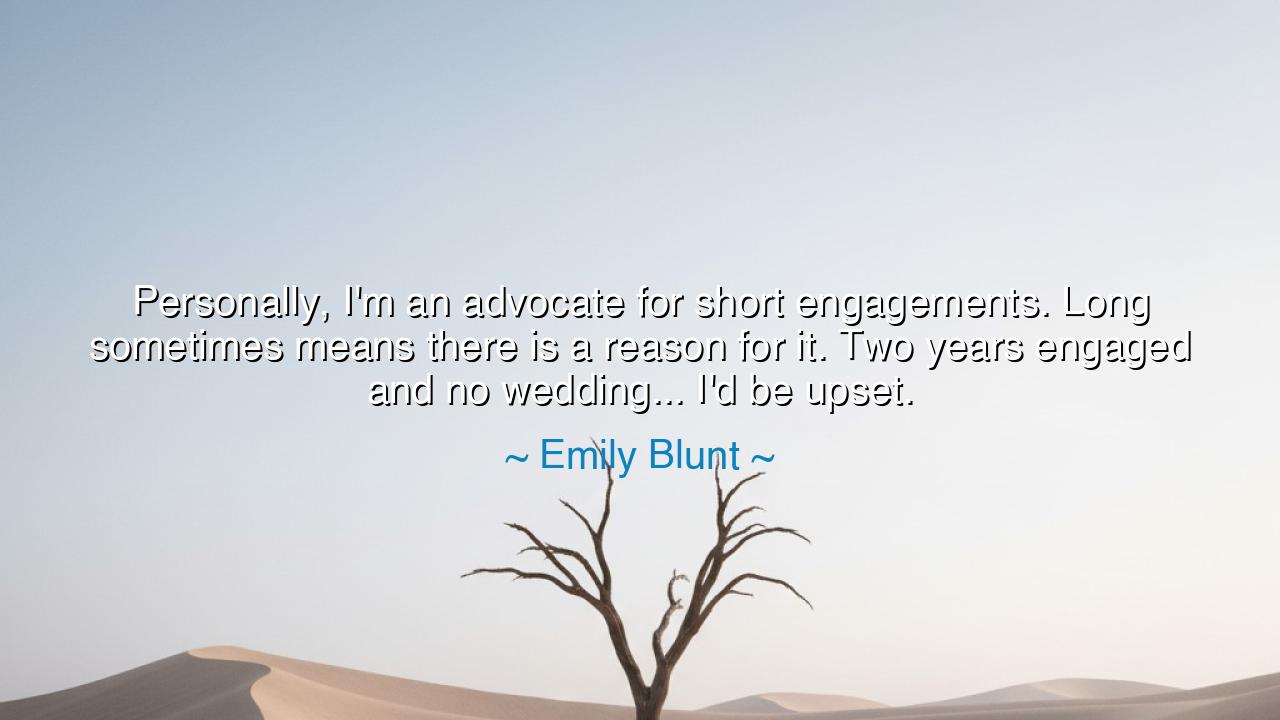
Personally, I'm an advocate for short engagements. Long
Personally, I'm an advocate for short engagements. Long sometimes means there is a reason for it. Two years engaged and no wedding... I'd be upset.






In these candid words, Emily Blunt reflects on the nature of engagement and the passage of time in matters of the heart. She expresses a preference for short engagements, cautioning that prolonged delays may signal hidden obstacles or hesitation. Blunt observes that when a couple remains engaged for two years or more without a wedding, it can breed uncertainty and emotional strain. Her insight reminds us that love, while patient, flourishes best when accompanied by decisive commitment, lest doubt erode its joy and vitality.
The origin of this reflection lies in Blunt’s personal perspective as a participant in modern matrimonial customs, where engagement serves both as a symbol of intent and a period of preparation. Across cultures and history, engagement has been a time to plan, reflect, and consolidate resolve. Yet, as Blunt notes, an extended engagement can raise questions: is the delay practical, circumstantial, or indicative of wavering commitment? Her words underscore the delicate balance between anticipation and action, highlighting the emotional stakes entwined with the passage of time.
History provides illuminating parallels. Consider Queen Victoria and Prince Albert, whose engagement lasted nearly three years—a period that included careful negotiation of political and social considerations. Though their union became legendary for its devotion, the delay was purposeful, tied to circumstance rather than hesitation. Blunt’s modern concern reflects a simpler, more immediate expectation: when love is ready, action must follow, lest impatience or doubt overshadow the celebration of union.
Blunt’s quote also emphasizes the psychological importance of closure and certainty. An engagement, while symbolic of future commitment, is a liminal space in which love is tested by time and circumstance. Long delays can create anxiety, challenge trust, and sap enthusiasm. By advocating for short engagements, she reminds us that life’s milestones are best honored when they proceed with clarity, intention, and decisive movement, allowing love to fully inhabit the present while anticipating the future.
Ultimately, this quote is a meditation on commitment, timing, and trust. Emily Blunt teaches future generations that love is strengthened when expressed through timely and purposeful action. Let this wisdom endure: engagement is a sacred promise, but its fulfillment through marriage transforms anticipation into reality. Too long a delay risks turning hope into frustration, while decisive commitment magnifies joy, fortifies trust, and sanctifies the journey from lovers to partners in life.






PUnguyen phuong uyen
Her comment made me think about how different people interpret commitment. For some, engagement is already a form of commitment; for others, marriage seals it. If an engagement drags on, does it signal fear of change, or simply a different pace of life? I find it fascinating how emotions, logistics, and social expectations all mix in this one phase of a relationship. What truly defines readiness for marriage — time or intention?
KTNguyen Khanh Trinh
I actually agree with this sentiment in some ways. Long engagements can lead to uncertainty, hesitation, or even emotional distance over time. Yet, it’s also worth asking — does setting a shorter timeline really guarantee stronger commitment? Maybe the issue isn’t how long the engagement lasts, but how intentional both people are about the future. Do you think short engagements reflect confidence, or could they sometimes hide impulsiveness?
TNThanh Ngan
I find this viewpoint interesting because it touches on a cultural tension — the idea that marriage should follow quickly once engagement happens. But is that expectation still relevant today? With so many people marrying later or focusing on careers first, a longer engagement might just reflect a practical reality. I’m curious whether Blunt’s comment comes from tradition or personal experience, and whether others still feel the same pressure.
TLDao Thuy Linh
This opinion feels refreshingly candid, but it also makes me curious — is a short engagement always better for emotional clarity? Sometimes, rushing into marriage can mask unresolved issues. On the other hand, waiting too long might lead to second-guessing. I’d love to know how one determines the right balance between excitement and caution in such a deeply personal commitment. Can timing truly affect relationship success?
TDNguyen Trong Duc
I understand Emily Blunt’s perspective here — long engagements can sometimes feel uncertain or stagnant. But I wonder if that’s always fair. Aren’t there situations where couples simply need time to plan, save money, or align their lives before taking the next step? Maybe the duration of an engagement doesn’t necessarily indicate doubt, but rather different circumstances or priorities. What do you think defines a ‘healthy’ engagement period?